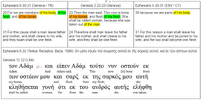Northern Crofter
Puritan Board Sophomore
I'll start by saying I don't know which forum this fits so please feel free to put it where it belongs, admin.
The sermon this past Lord's Day in our congregation was from Ephesians 5: "Husbands, Love Your Wives, Just as Christ Also Loved." What caught my attention as the text was being read (I believe from the NASB) was the difference in v.30 (from my Geneva). The TR seems to better follow Paul's reference (albeit in reverse order) to Genesis 2. I'm rather visual so I had to chart it out to see:

I am not an expert on textual issues or Greek/Hebrew - I switched to and prefer TR versions because it is what the men used who God used to create the confessional standards I adhere to (for example, most CT versions question the ending of Mark's Gospel, but verses from it are used 4 times in the WCF and 4 times in the LC as a proof text so they apparently believed it to be part of the Canon of the Scripture). But a few questions evolved in my head the past few days. I've had trouble separating them as they all seem to flow together:
Should later NT manuscripts be considered less reliable if there is evidence of editing/compiling prior to canonization when there is perhaps just as much evidence of editing/compiling in the OT (for example, the Psalter, Proverbs, Samuel/Kings/Chronicles)? For example, in the text above, if Tychicus' original (and no longer available) autograph of Paul's letter to the Ephesians was the longer TR version, but then copies were created, some of which were shorter (like the CT version), would WCF 1.9 apply when it states that "The infallible rule of interpretation of Scripture is the Scripture itself"? Would this then also be a basis for deciding which Greek NT text is "better" (if it aligns more completely with the OT reference/text)? Which leads to a related question: does WCF 1.8 forbid using the LXX and Latin-based copies in textual decisions when it states: "The Old Testament in Hebrew (which was the native language of the people of God of old), and the New Testament in Greek (which at the time of the writing of it was most generally known to the nations), being immediately inspired by God, and by his singular care and providence kept pure in all ages, are therefore authentical; so as in all controversies of religion the Church is finally to appeal unto them."?
I appreciate any thoughts and am not trying to reopen the TR/CT can of worms - I'm mostly curious about how people apply these confessional standards to textual decisions.
The sermon this past Lord's Day in our congregation was from Ephesians 5: "Husbands, Love Your Wives, Just as Christ Also Loved." What caught my attention as the text was being read (I believe from the NASB) was the difference in v.30 (from my Geneva). The TR seems to better follow Paul's reference (albeit in reverse order) to Genesis 2. I'm rather visual so I had to chart it out to see:

I am not an expert on textual issues or Greek/Hebrew - I switched to and prefer TR versions because it is what the men used who God used to create the confessional standards I adhere to (for example, most CT versions question the ending of Mark's Gospel, but verses from it are used 4 times in the WCF and 4 times in the LC as a proof text so they apparently believed it to be part of the Canon of the Scripture). But a few questions evolved in my head the past few days. I've had trouble separating them as they all seem to flow together:
Should later NT manuscripts be considered less reliable if there is evidence of editing/compiling prior to canonization when there is perhaps just as much evidence of editing/compiling in the OT (for example, the Psalter, Proverbs, Samuel/Kings/Chronicles)? For example, in the text above, if Tychicus' original (and no longer available) autograph of Paul's letter to the Ephesians was the longer TR version, but then copies were created, some of which were shorter (like the CT version), would WCF 1.9 apply when it states that "The infallible rule of interpretation of Scripture is the Scripture itself"? Would this then also be a basis for deciding which Greek NT text is "better" (if it aligns more completely with the OT reference/text)? Which leads to a related question: does WCF 1.8 forbid using the LXX and Latin-based copies in textual decisions when it states: "The Old Testament in Hebrew (which was the native language of the people of God of old), and the New Testament in Greek (which at the time of the writing of it was most generally known to the nations), being immediately inspired by God, and by his singular care and providence kept pure in all ages, are therefore authentical; so as in all controversies of religion the Church is finally to appeal unto them."?
I appreciate any thoughts and am not trying to reopen the TR/CT can of worms - I'm mostly curious about how people apply these confessional standards to textual decisions.
